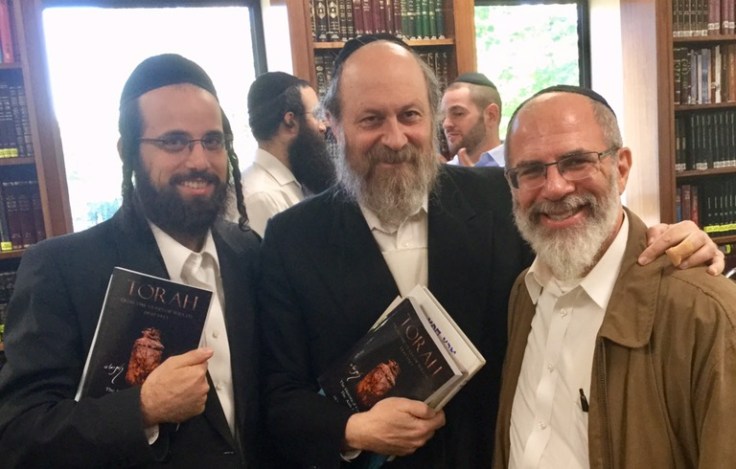To the Hasidim steeped in the religious significance of the ritual calendar, the Sabbath known as Zakhor (March 23, 1940) must have seemed a cruel redundancy. Literally called “remember,” the Sabbath preceding the holiday of Purim is named for a few publicly read Torah verses (Deuteronomy 25:17-19) that memorialize the attack of Israel’s primordial enemy, the biblical nation known as Amalek:
Remember what Amalek did to you on your way out of Egypt; how he met you on the way, and struck your stragglers, those who were weak at your end, when were tired and exhausted; and he did not fear God. Therefore it will be, when the Lord your God will give you rest from the enemies that surround you, in the land which the Lord your God gave you as inheritance to possess it, that you will blot out the remembrance of Amalek from under heaven; you will not forget.
The Rebbe returned once again to the theme that pervaded much of his prewar work, arguing for a reinvigoration of Hasidic practice. Playing on the double meaning of the Hebrew verse he met you on the way, which can also be rendered he cooled you on the way, the Rebbe excoriated the weakening of religious enthusiasm among those Jews who slavishly admired the secular wisdom associated with German culture. Ringelblum noted this phenomenon a few months later, writing that there is a “tendency among some of the young people to envy the Others, who are strong, firm, proud, enjoy[ing] the good things of life. There’s a tendency for some of the young people to imitate Them.”
…there were some lowly people who were impressed by the secular wisdom which Amalek took pride in, and considered it attractive. This caused a “cooling off” of their regard for Torah and the wisdom of Torah, saying “the wisdom of the world is also beautiful,” and “they also have noble characteristics,” and “this knowledge has worldly value.” Thus God introduced Amalek to you, with all his attendant worldly wisdom, and also revealed all of his wickedness, the impurity of his heart, his murderous nature, and his putrid wisdom infected you. You have already seen the reality of the essence of secular knowledge. God had already revealed the consequences of this in Spain, when Jews were drawn after their secular knowledge and philosophy, and they were then persecuted and expelled…Now you see and feel with intensity the beauty of the wisdom of Amalek…they know how to speak persuasively, but inwardly they are full of the stench of rot. When it meets their needs or even their inclinations alone, they employ the same artificial intellectual constructs, which they had previously employed to extol the virtues of morality, to now defend theft, robbery, murder, and other atrocities as praiseworthy. Such is not the case with our holy Torah and its holy wisdom.
The following Sunday, Purim, would normally have been celebrated as a holiday of great rejoicing and even frivolity, commemorating the victory of the Persian Jews over Amalek, described in the Book of Esther. The mood at the Piaseczno Rebbe’s court, however, was somber, as described by the firsthand account of Shimon Huberband:
I went to the home of the Piaseczno Rebbe…The Rebbe sat in his shtrayml and his silk caftan, and spoke with a few Hasidim about the terrible situation of the Jews. There would be no festive meal and no Hasidic celebration as was the practice every year. The mood was terrible; the predominant spirit wasn’t of Purim, but of Tisha B’av. People consoled each other by saying that spring was just around the corner, and during the spring of 1940…we would surely be saved.
The Rebbe’s brief message that Purim reflected his efforts to counter the mood, reinforcing the need for joy on Purim, even amidst suffering.
It is written in the holy Tikunei Zohar that Purim is like Yom Kippur. This may mean that just as the fasting and repentance of Yom Kippur must be performed whether or not a person wishes, rather we observe this as a decree of the Holy One, so too the joy of Purim—one must become joyous, not only if a person is already in a state of joy, or even if one is in a situation where one might place one’s self in a state of joy. Rather, even if one is in a lowly, broken-hearted state, mind and all spirit crushed, it is decreed that one must bring, at any rate, some sparks of joy into one’s heart.
The Rebbe’s Purim comments were unusually brief, possibly truncated. On that day, Czerniaków noted in his diary, “In the afternoon, on the Jewish streets, beatings of the Jews and window-breaking. A sort of a pogrom.” The Rebbe’s message may have been cut short by the violence in the streets.
Taken from Torah from the Years of Wrath: The Historical Context of the Aish Kodesh.


I liked looking at your blog
Good luck with it
Purim Sameach